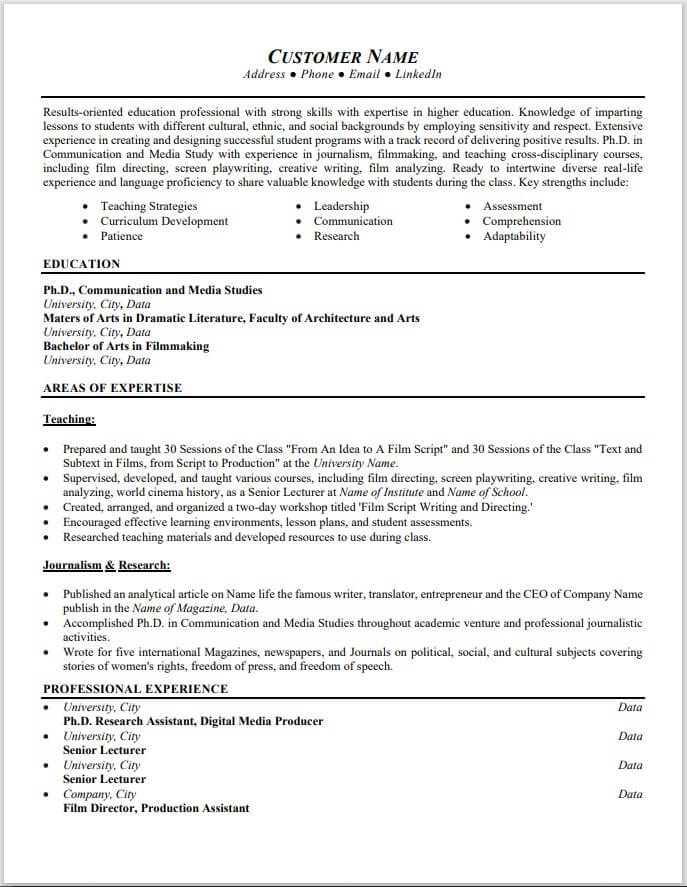
How to Write an Academic CV
What is an Academic Resume?
CV is an abbreviation for curriculum vitae, which translates from Latin as “life course” or biography. In the case of an academic resume, the person will have to describe their science career and present their work in the best possible way. Such a document will be quite large in size, because this is the kind of paper that is commonly used to specify much more information than in a regular resume. There is no need to shorten any achievements or the list of scientific papers, as this document is usually more than three pages. The main differences between CV and most common resume will be presented below.

How to Write an Academic CV
The Differences Between CV and Resume
A regular resume is a small document (1-2 pages) with mention of skills, achievements and work experience for a certain period of time. Usually, the filling of the resume is regulated depending on the requirements of the desired position. If you need help with writing a professional resume, you can use services that specialize in this. In the case of an academic CV, the candidate must submit a complete history of their career, including scientific publications, teaching experience, awards, list of grants etc. As a result, there are no length restrictions on the CV, as various scientists’ career backgrounds may differ. It is also worth remembering that the target audience of a regular resume will be businesses or nonprofit, government and other organizations, while the academic curriculum vitae is intended only for the scientific academic world.
Read More: How Long Should a Resume Be?
Academic CV Example:

How to Make an Academic CV?
Every successful CV in the scientific field has certain required components. An academic resume consists of the following blocks of information:
- Name and contact details
At the very beginning of the document, a person should indicate the first and last name, as well as contacts, for example, phone and email.
- Summary
Here a person should summarize the highlights of his career. At this point, the academician can indicate the most important skills, as well as briefly describe his positive results of work on projects.
- Education
At this point, all received degrees are usually indicated in order from the newest to the oldest. It is also necessary to put information about the place of receiving the diploma, as well as the year of study. When specifying a PhD in this list, an academic must also indicate the title of the dissertation and the place where they got it.
- Academic Employment
Academic employment refers to work experience in a scientific field. Here a scientist can indicate positions of postdoctoral or instructorships, and the years in these positions. The names of the organizations where the employee received this job experience are also required.
If a person has work experience in teaching, this information is not included here. For this type of activity, there is a separate item in the CV.
- Publications
At this point, employees must submit their scientific publications. Ideally, the candidate should enter all of his work, but if there are too many of them, then it is necessary to select the most relevant and suitable for the desired position.
There are several ways to sort such a list:
- Alphabetically
- By publication date
- By type of publication (books, articles, reviews, etc.)
- Awards
The academician must indicate all his received awards in this field. Do not forget about the year, as well as the organization that awarded them the honors or award.
- Grants
Also in academic CV examples there can often be find a list of received grants. In addition to the name of the grant received, there should be indicated the year, the name of the organization that issued it, and the monetary amount.
- Conferences
Here academics can indicate information about conferences where they took part as speakers or published their scientific works.
- Teaching Experience
Information on experience as a teacher is usually presented as a separate block. Here professors indicate the years of work in a certain position in any educational institution. This information can be submitted both chronologically by year and sorted by place of work.
- Other
It is worth remembering that all CVs are different from each other, so there is not only one reference list of blocks. It is also very likely that different institutions may have their own requirements for the content of the scientific resume. A candidate can also add information about their invited talks, research experience, references, and of course skills and languages to the document.
Tips for Creating a Great Academic CV
In addition to the list of the parts for a good CV, there are also some basic tips that can help newbies write their own academic curriculum vitae.
- Use bold, italic, and lists
No one should make a bunch of text out of a CV, which is very difficult to read. It is better to divide the information into blocks, highlight the headings in bold, and do not be afraid to use bullets for lists. Of course, it is worth remembering the formality and not using impressionistic designs, but nevertheless, the variety in the design should be added.
- Place the most important information in the middle or left of the page
It will be strategically more successful to place the title of the position, award or publication on the left, and additional data on the right. So this information will quickly attract the reader’s attention, which means they will quickly receive all the necessary information about the academician.
- Be consistent
It’s better to pick one font and a few bullet options for the entire document and don’t change them. The completely different design of the academic resume will make it unsuitable for quick reading and analysis, which will significantly complicate the work of the employer and affect the candidate’s reputation.
- Consult an experienced academician
After completing the CV, many newbies will be helped by consultation with more expert colleagues. It is worth showing the completed document to familiar scientists with experience in making scientific resumes. An experienced person will quickly pay attention to shortcomings and help to correct them. If a candidate is a graduate and does not have familiar scientists, then they can use services for writing academic CVs.
Importance of a Scientific Resume
Writing a good curriculum vitae plays a key role when looking for an academic job. After all, the immediate future career development depends on how the scientist can present himself. Professional and personal skills are very important to the university, as well as awards, licenses, and especially scientific publications. This is how the management decides how suitable a candidate is for a particular research or educational program.
Therefore, the goal of every job seeker in science will be, first of all, ordering his entire path into a concise and relevant document, with the help of which it will be possible to quickly and easily learn about all the components of their career.




